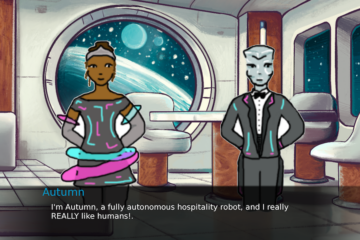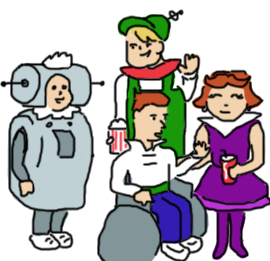I applied to do a “Big Idea” blog post on John Scalzi’s blog for The Gods Awoke ,as I did for Galactic Hellcats. Well, I didn’t get it, but this is what I would have posted.
If gods were real, could you believe? Should you? The Big Idea in The Gods Awoke is that evidence can have a negative effect on how people form beliefs. I know that sounds way too esoteric. I promise there’s trickster gods flirting with pretty boys, too.
What made me first ponder the development of faith?
When I was in high school, we were given the assignment of debating evolution vs. creationism as we read “Inherit the Wind”, and I found myself almost alone on the evolution side, with four other kids verses the rest of the class and the teacher. I distinctly remember one exchange, after class, with the English teacher, as I tried to understand her side of things. I was angry about a particular point she’d given the other side. While I had provided cited sources for everything I said, the Creationist side got away with “They say” and “some people say.”
“You can’t accept something as truth without evidence,” I said.
“Marie,” she shook her pretty blonde curls, “that’s what faith IS. Faith is accepting something as true without evidence.”
My mind was blown. No one had ever bothered to define this term for me, and now that I heard this definition, I couldn’t believe anyone considered it a virtue.
I wondered, then, if a true believer received incontrovertible evidence of her god, could that actually hurt her belief? It would cease to be a matter of faith and become one of mundane reality.
Here’s a supporting example. I studied geology in college, and one day I visited a flea market in rural Ohio where I found a well-formed amethyst geode. As I examined it, the salesman approached and said, “Yes, it’s gorgeous, and did you know, scientists have no idea how they form?!”
Baby Geologist me leapt to explain. “Actually, geodes form in a number of ways! This one started as a bubble in volcanic—”
“NO. They have no idea! It’s a mystery!”
The salesman was angry. As well he should be. He had this magical miracle, and I was stomping on it with my facts. His need for things to be unknowable made him resistant to evidence, even resentful of it.
(Geodes are hardly a miracle, or a religion, but are no less wonderful for being a matter of crystals cooling or depositing at different rates in a cavity left by gas, fossils, or even eroded nodules of mud! Isn’t that cool? Oop. Digression.)
I was primed by my background to become a skeptic. My father enrolled my twin and me in Catechism to please his mother, but shortly afterward left the church and gave us the option to choose whether to stay. (We opted for Saturday morning cartoons).
“Religion is a box to put god in,” my dad said. “The more you define it, the smaller the box.”
My mother never discussed belief specifically. She was half-Jewish, told us she was Jewish, converted to evangelical Christianity, but also believed in astrology, I Ching, and the healing power of new-age witchcraft.
Which is to say, my parents were a hot mess of theologies, but they both felt it should be up to us kids to choose our own, so I became a student of comparative religions at a young age. I let friends drag me to Sunday schools and got into heated debates with elderly ladies and middle-aged preachers, many of whom asked me not to come back.
I witnessed a wide variety of the ways people interacted with their disparate faiths and felt a growing frustration at how little they saw beyond their own experiences.
I wanted to write about that. But should I?
It goes without saying that people feel deeply about their religion. Their sense of self, of community, of the world itself, are tied into it.
My high school drama club did a very innocuous and tame play called “God’s Favorite” which was a modern re-telling of Job, with gentle humor curated to be palatable to the mainstream Christian audiences of the US.
Some little old ladies came up to the cast (ourselves cherubic baby teen-agers, remember!) after opening night to angrily admonish us we were all going to burn in hell for the desecration of daring to laugh next to religious topics.
Yeah, there was no way I was going to touch real-world religion with a twenty-foot crosier. So I invented a religion. A matriarchy, because I’d seen enough of patriarchy, thanks. Not some exaggerated idea of matriarchy, but the sort of world where any given person would say “men have equal rights now – the head of the arbitration council is male!” but the head of the arbitration council is accused of “sleeping his way to the top.”
Basically, as matriarchal as we are patriarchal.
I picked out names of months and days of the week, listing out festivals and drawing a map of the city. I’ve always had a fascination with naming roads. Why do we do that? Why are Fairmont Boulevard and Brainard Road the same street for two blocks? Why are there two East 116ths that don’t connect? Would a different culture name roads after different things? How about all the roads being named for the emotion the first travelers felt walking it?
I digress. Insert a montage of Worldbuilding Daydreams.
At some point the pages and pages of Religious Texts and Rituals had to be set aside, because all that really mattered were the people, and how they felt.
I shake up their emotions with an unprecidented miraculous event, a seismic shift in the world on page one. Hee hee.
Different characters reacted differently to the same religious event, and I forced them together to debate and get inarticulate and think of the thing they should have said on the way home.
It was sadistic fun.
One of the main characters, Illoe, is an atheist, and he makes jokes about an imaginary god from an old comedy in the universe. (Skroktar, god of filth, will be a recognizable inside joke for some of my friends.) I wanted my imaginary religion to have its doubters, too, and its scandalous humor. I think those are necessary parts of any religious landscape. I could not imagine a Catholicism without Life of Brian or a Judaism without Jews In Space.
Illoe, my pretty boy character, works for a priestess who is eagerly climbing the rungs of religious establishment. Will she lose her faith when miracles happen outside her dining room window? Will Illoe lose his skepticism when a goddess hits on him? What about the heretic who thinks he woke the gods? How will this affect his faith? What will it reveal to each of them about the hidden ways belief was working inside of them?
That’s basically what it’s about, and complicated relationships, the things we don’t say to each other. And if it walks like a god, talks like a god, and throws mountains like a god, do we bow? Or get as far away as we can, as fast as possible?
You can pick up your own copy of The Gods Awoke anywhere books are sold!
Mac’s Backs * Space Cowboy Books * Bookshop.Org * Barnes & Noble * Amazon


